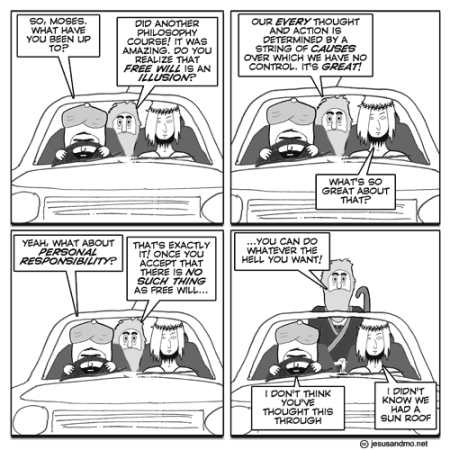Augustine, Boethius, Anselm & Aquinas, and Appiah on cosmopolitanism are up today in CoPhi. But Allen‘s the philosopher who’s influenced me most. More on that in a bit.
Is anyone, from God on down, “pulling our strings”? We’d not be free if they were, would we? If you say we would, what do you mean by “free”? Jesus and Mo have puzzled this one:
Here too: Free Willy! But as usual, the Atheist Barmaid is unpersuaded.
(As I always must say, when referencing this strip: that’s not Jesus of Nazareth, nor is it the Prophet Mohammed. They’re just a couple of cartoonish guys who often engage in banter relevant to our purposes in CoPhi. It’s just harmless fun, zealots, not blasphemy. But if it provokes a little thought, it’s useful.)
Augustine proposed a division between the “city of god” and the “earthly city” of humanity, thus excluding many of us from his version of the cosmos. “These two cities of the world, which are doomed to coexist intertwined until the Final Judgment, divide the world’s inhabitants.” SEP
Boethius was consoled by the thought that God’s knowing he was about to be tortured to death in no way impaired his, Boethius’s, freedom. That’s apparently because God knows things timelessly, sees everything “in a go.” I don’t think that would really make me feel any better, in my prison cell. The real consolation of philosophy comes when it contributes to the liberation of mind and body. But it’s still very cool to imagine Philosophy a comfort-woman, reminding us of our hard-earned wisdom when the going gets impossible.
And then, of course, they killed him. The list of martyred philosophers grows. And let’s not forget Hypatia and Bruno. The problem of suffering (“evil”) was very real to them, as it is to so many of our fellow world-citizens. You can’t chalk it all up to free will. But can we even chalk torture or any other inflicted choice up to it, given the full scope of a genuinely omniscient creator’s knowledge? If He already knows what I’m going to do unto others and what others will do unto me, am I in any meaningful sense a free agent who might have done otherwise? The buck stops where?
[Christians 2, Philosophers 0… Christians & Muslims…JandMoandPaul…Mystics, scholastics, Ferengi… faith & reason…]
Undeterred by such questions, Anselm continued to stump for the divine moral perfection (and omnipotence and omnscience) of a being “than which none greater could be conceived.” His Ontological Argument is either ingenious or ridiculous, but is not persuasive. Strange argument indeed.
Aquinas was sure there had to be an uncaused cause in back of everything, or else we’d never get to an end of explaining. Well, we probably won’t. Not ’til the would-be explainers themselves are gone. But is an uncaused cause really a step forward, explanatorily speaking?
The appeal of Anthony Appiah’s Cosmopolitanism is summed up, for me, in his observation that the fundamental aim of our philosophical conversations is to enable us “to live with people, whether you agree with them or not.” That’s helpful.
Appiah is the headliner at this year’s annual March meeting of the Society for the Advancement of American Philosophy, this time in New Jersey, with the conference theme “American Philosophy and Cosmopolitanism.” [Appiahn Way… The Real Cosmopolitans]
I’ve found members of the Church of Jesus Christ of Latter Day Saints, for instance, to be amongst the most agreeable people on the planet – and I couldn’t disagree more with many of their ideas. Simon Critchley’s Stone essay last September includes one friendly Mormon’s cheerful announcement that “we, too, can become Gods, American Gods, no less.”
Well, that was the premise and the title of an entertaining fiction from Neil Gaiman. But what would Augustine, Anselm, Boethius et al think about it? Not much.
The great secret is that, through heroic effort and striving, God was a man who became exalted and now sits enthroned in the heavens. You see, God was not God from all eternity, but became God.
A Woody Allen character was once accused of playing God. “I have to model myself on someone.”
Woody’s not God, nor even remotely a God (a Phil Connors/Groundhog God). He’s very human. But he asks great questions (recently answered some too), shoots great scenes, and cares. [DS]
(My favorite Manhattan scene, btw, asks What Makes Life Worth Living?)
But everyman a God is really not a serious proposition, is it? Anymore than the notion of one man, one planet? Can it really be true that Joseph Smith’s followers anticipate living forever off-world with their families and robots, Jetson-like? Or is that just another example of uninformed bias? (We could ask that Mormon Girl on Twitter what they really believe. Or check out the Book of Mormon.) Anyway, live and let live. It’s a big cosmos.






